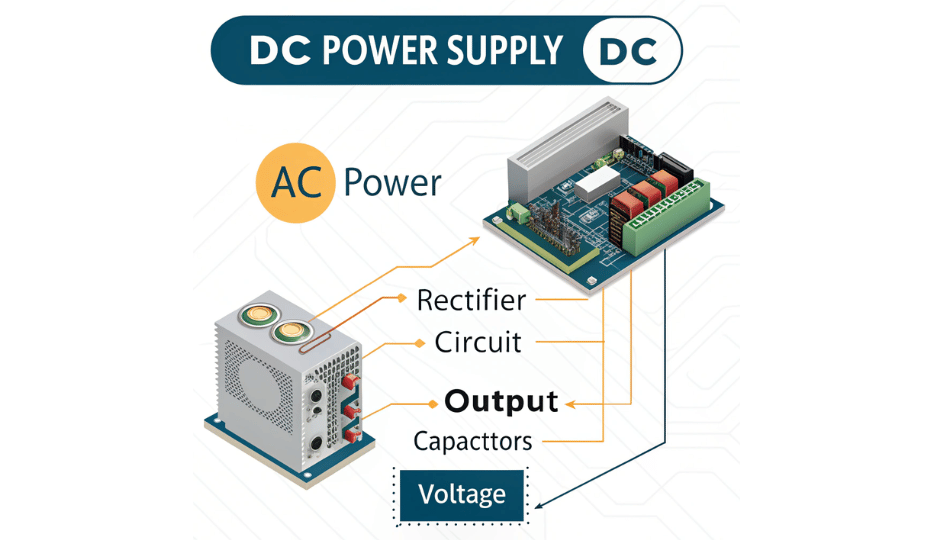A DC power supply is an electrical device that provides a constant direct current (DC) voltage to a load. It is widely used in various industries, laboratories, and electronic applications. Unlike alternating current (AC) power, which changes direction periodically, DC power flows in a single direction, making it ideal for powering electronic circuits and devices.
How DC Power Supply Works
DC power supplies convert AC power from the main electrical grid into a stable DC output. The conversion process typically involves the following stages:
- Transformation (Step-down/Step-up): The input AC voltage is adjusted to the desired level using a transformer.
- Rectification: The AC voltage is converted to pulsating DC using diodes in a rectifier circuit.
- Filtering: The rectified voltage is smoothed using capacitors or inductors to reduce fluctuations.
- Regulation: Voltage regulators ensure a stable and consistent DC output by compensating for variations in input voltage and load current.

Types of DC Power Supplies
DC power supplies come in various forms, each designed for specific applications:
Linear Power Supply
A linear power supply uses a transformer, rectifier, and voltage regulator to provide a smooth DC output. It is known for its low noise and stable performance but is generally larger and less efficient than switching power supplies.Switching Power Supply (SMPS)
Switching power supplies use high-frequency switching regulators to convert AC to DC efficiently. They are compact, lightweight, and energy-efficient, making them ideal for modern electronic devices.Programmable Power Supply
These power supplies allow users to adjust voltage and current output dynamically. They are commonly used in laboratories, testing environments, and industrial automation.Battery-Based Power Supply
Batteries provide a portable DC power source. They are used in mobile devices, emergency backup systems, and off-grid power applications.
Applications of DC Power Supply
DC power supplies are essential in various industries and applications:
- Consumer Electronics: Used in mobile phones, laptops, and household gadgets.
- Industrial Equipment: Powers control systems, sensors, and automation machinery.
- Medical Devices: Supplies power to imaging machines, patient monitoring systems, and diagnostic equipment.
- Telecommunications: Provides stable voltage for network equipment and communication infrastructure.
- Automotive Industry: Used in electric vehicles (EVs) and automotive electronics.
- Research & Development: Essential for testing and developing new electronic circuits and devices.
Advantages of DC Power Supply
- Stable Output: Ensures a constant voltage for reliable performance.
- High Efficiency: Especially in switching power supplies, reducing energy waste.
- Compact Design: Modern DC power supplies are lightweight and portable.
- Adjustable Output: Many models allow fine-tuning of voltage and current.
- Low Noise: Ideal for sensitive electronic applications.
How to Choose the Right DC Power Supply
Selecting the right DC power supply depends on several factors:
- Voltage and Current Requirements: Ensure the power supply can provide the necessary output voltage and current for your device.
- Load Regulation: A good power supply maintains stable output even with varying loads.
- Efficiency: Higher efficiency reduces power loss and heat generation.
- Protection Features: Overvoltage, overcurrent, and thermal protection are essential for safety.
- Size and Portability: Compact designs are preferred for mobile applications.
- Programmability: If needed, opt for a programmable power supply for versatile testing.
Future Trends in DC Power Supplies
The demand for DC power supplies is evolving with technological advancements. Key trends include:
- Integration with Renewable Energy: Solar panels and wind turbines require efficient DC power management.
- Wireless Power Transmission: Emerging technologies aim to eliminate wired connections for DC power.
- Smart Power Supplies: IoT-enabled power supplies offer remote monitoring and control.
- Higher Efficiency and Miniaturization: Advances in semiconductor technology are making power supplies more compact and energy-efficient.
DC power supplies play a crucial role in modern electrical and electronic applications. With various types available, from linear to switching and programmable power supplies, they cater to diverse industry needs. Understanding their working principles, applications, and selection criteria helps users choose the best power supply for their specific requirements. As technology advances, DC power supplies will continue to evolve, offering greater efficiency, flexibility, and integration with future energy solutions.




